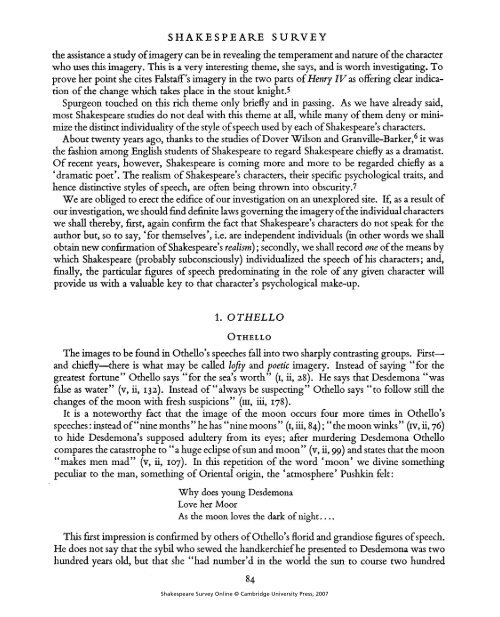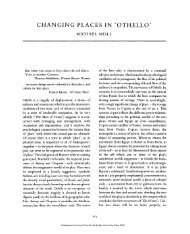the individualization of shakespeare's characters through imagery
the individualization of shakespeare's characters through imagery
the individualization of shakespeare's characters through imagery
Create successful ePaper yourself
Turn your PDF publications into a flip-book with our unique Google optimized e-Paper software.
SHAKESPEARE SURVEY<br />
<strong>the</strong> assistance a study <strong>of</strong> <strong>imagery</strong> can be in revealing <strong>the</strong> temperament and nature <strong>of</strong> <strong>the</strong> character<br />
who uses this <strong>imagery</strong>. This is a very interesting <strong>the</strong>me, she says, and is worth investigating. To<br />
prove her point she cites Falstaff's <strong>imagery</strong> in <strong>the</strong> two parts <strong>of</strong> Henry IV as <strong>of</strong>fering clear indication<br />
<strong>of</strong> <strong>the</strong> change which takes place in <strong>the</strong> stout knight.5<br />
Spurgeon touched on this rich <strong>the</strong>me only briefly and in passing. As we have already said,<br />
most Shakespeare studies do not deal with this <strong>the</strong>me at all, while many <strong>of</strong> <strong>the</strong>m deny or minimize<br />
<strong>the</strong> distinct individuality <strong>of</strong> <strong>the</strong> style <strong>of</strong> speech used by each <strong>of</strong> Shakespeare's <strong>characters</strong>.<br />
About twenty years ago, thanks to <strong>the</strong> studies <strong>of</strong> Dover Wilson and Granville-Barker, 6 it was<br />
<strong>the</strong> fashion among English students <strong>of</strong> Shakespeare to regard Shakespeare chiefly as a dramatist.<br />
Of recent years, however, Shakespeare is coming more and more to be regarded chiefly as a<br />
'dramatic poet'. The realism <strong>of</strong> Shakespeare's <strong>characters</strong>, <strong>the</strong>ir specific psychological traits, and<br />
hence distinctive styles <strong>of</strong> speech, are <strong>of</strong>ten being thrown into obscurity. 7<br />
We are obliged to erect <strong>the</strong> edifice <strong>of</strong> our investigation on an unexplored site. If, as a result <strong>of</strong><br />
our investigation, we should find definite laws governing <strong>the</strong> <strong>imagery</strong> <strong>of</strong> <strong>the</strong> individual <strong>characters</strong><br />
we shall <strong>the</strong>reby, first, again confirm <strong>the</strong> fact that Shakespeare's <strong>characters</strong> do not speak for <strong>the</strong><br />
author but, so to say, 'for <strong>the</strong>mselves', i.e. are independent individuals (in o<strong>the</strong>r words we shall<br />
obtain new confirmation <strong>of</strong> Shakespeare's realism); secondly, we shall record one <strong>of</strong> <strong>the</strong> means by<br />
which Shakespeare (probably subconsciously) individualized <strong>the</strong> speech <strong>of</strong> his <strong>characters</strong>; and,<br />
finally, <strong>the</strong> particular figures <strong>of</strong> speech predominating in <strong>the</strong> role <strong>of</strong> any given character will<br />
provide us with a valuable key to that character's psychological make-up.<br />
1. OTHELLO<br />
OTHELLO<br />
The images to be found in O<strong>the</strong>llo's speeches fall into two sharply contrasting groups. First—<br />
and chiefly—<strong>the</strong>re is what may be called l<strong>of</strong>ty and poetic <strong>imagery</strong>. Instead <strong>of</strong> saying "for <strong>the</strong><br />
greatest fortune" O<strong>the</strong>llo says "for <strong>the</strong> sea's worth" (i, ii, 28). He says that Desdemona "was<br />
false as water" (v, ii, 132). Instead <strong>of</strong> "always be suspecting" O<strong>the</strong>llo says "to follow still <strong>the</strong><br />
changes <strong>of</strong> <strong>the</strong> moon with fresh suspicions" (m, iii, 178).<br />
It is a noteworthy fact that <strong>the</strong> image <strong>of</strong> <strong>the</strong> moon occurs four more times in O<strong>the</strong>llo's<br />
speeches: instead <strong>of</strong> *' nine months'' he has'' nine moons'' (1, iii, 84); " <strong>the</strong> moon winks'' (iv, ii, 76)<br />
to hide Desdemona's supposed adultery from its eyes; after murdering Desdemona O<strong>the</strong>llo<br />
compares <strong>the</strong> catastrophe to "a huge eclipse <strong>of</strong> sun and moon" (v, ii, 99) and states that <strong>the</strong> moon<br />
"makes men mad" (v, ii, 107). In this repetition <strong>of</strong> <strong>the</strong> word 'moon' we divine something<br />
peculiar to <strong>the</strong> man, something <strong>of</strong> Oriental origin, <strong>the</strong> 'atmosphere' Pushkin felt:<br />
Why does young Desdemona<br />
Love her Moor<br />
As <strong>the</strong> moon loves <strong>the</strong> dark <strong>of</strong> night<br />
This first impression is confirmed by o<strong>the</strong>rs <strong>of</strong> O<strong>the</strong>llo's florid and grandiose figures <strong>of</strong> speech.<br />
He does not say that <strong>the</strong> sybil who sewed <strong>the</strong> handkerchief he presented to Desdemona was two<br />
hundred years old, but that she "had number'd in <strong>the</strong> world <strong>the</strong> sun to course two hundred<br />
84<br />
Shakespeare Survey Online © Cambridge University Press, 2007



